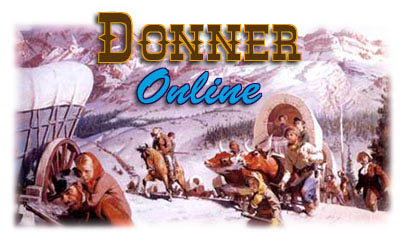

Introduction | The Task | The Process | The Roles | Conclusion | HyperText Dictionary
The plight of the Donner Party remains one of the most poignant episodes in the history of westward expansion during the 19th Century. "Donner Online" is a type of Web-based activity in which you learn about a topic by collecting information, images, and insights from the Internet, and then you "paste" them into a multimedia Scrapbook (a HyperStudio stack or a Web page) to share your learning with others.You will be working in teams where group members take on different roles and look for certain kinds of information, answers, and insights. When your group puts it all together to create your Scrapbook, you will be exposed to what your team members have learned. Of course, you too will be sharing everything you picked up on your study of the Donner tragedy. The last phase of creating your group's multimedia product focuses you on answering such questions as:
- What would it have been like to be a member of the Donner Party?
- How would modern day settlers make it through conditions like those that confronted the Donner Party?
- Is humor appropriate in the face of tragedy?
- How do you balance opportunity and its possible risks?
- How can facts and theories clarify or muddy the truth?
- How can humans find peace in a world that couples natural beauty with life-threatening danger?
Your task is to:
- Take on one of the roles listed below.
- Complete the task related to the role through exploring Internet links.
- Combine your learning into a group project that expresses your thinking.
There are three main parts to this project:
Phase 1: Gaining Background knowledge
Phase 1: Gaining Background Knowledge
Before becoming your role, check that you and everyone in your
group understand the basic facts behind the Donner Party's history. Use the
links listed after the questions. Make sure that each member of each group can
answer the basic questions:
Use these links:
Phase 2: Collecting Information
This is where you take on one of the roles and explore the related
Internet links. Have fun. Look for interesting things, important things, and
surprising things.
Role
Learning Links
The
Historian Background information on the Oregon Trail
The
Diarist Relate first-hand experience of crossing
The
Cartographer Uncover maps of the area, the lake, the pass, etc.
The
Correspondent
The
Pictorialist Find illustrations of the locale, people, equipment, etc.
The
Jester Can jokes about cannibalism to be in good taste?
The
Provisioner,
c. 1995 What to bring on a crossing: Past & Present
The
Scientist Insights about starvation and physical stress
Phase 3: Creating Learning Products
Now that you have "collected" information, the next phase challenges you to extend or refine your thinking. This will be achieved by putting together your group's multimedia Scrapbook. Choose and download the appropriate software so that you can get started creating your HyperStudio stack or Web page.
Opportunity & Risk, Beauty & Danger, Humor & Tragedy... It often seems that life presents us with complex and sometimes deadly experiences. Through looking closely at the facts and issues behind the history of the Donner Party, we hope that you can express a little more clearly what you think and feel about experiences that let us all know what it means to be human.